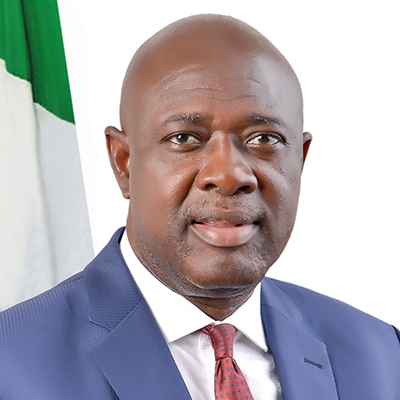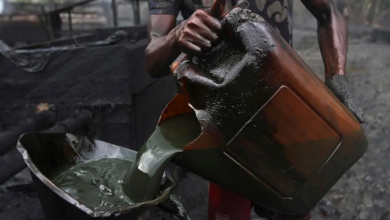Lokpobiri Seeks Reduction of Bureaucracy in Petroleum Sector, Eyes $5bn in Bonga North Project

The Minister of State Petroleum Resources (Oil), Senator Heineken Lokpobiri, yesterday urged heads of agencies and top civil servants to minimise unnecessary bureaucracy in the petroleum ministry to make the oil and gas sector more competitive.
Speaking at the opening of the ministry’s retreat in Abuja, tagged: “Building Synergy for Enhanced Development in Oil and Gas Sector”, the minister explained that the event was a follow-up to the one organised by the presidency last year, which bordered on how key performance indicators will be achieved.
Present at the event were the heads of the Nigerian National Petroleum Company Limited NNPC (NNPC), the Nigerian Upstream Petroleum Regulatory Commission (NUPRC), Nigerian Nuclear Regulatory Authority (NNRA), Petroleum Training Institute (PTI), among others.
Lokpobiri cautioned against turning the event to another talk show, explaining that the targets set for the ministry by President Bola Tinubu, including ramping up crude oil output must be met and surpassed.
According to the minister, the solution to Nigeria’s economic problems in the short-term lie within the oil and gas industry, from where he said Nigeria gets up to 90 per cent of its FX earnings.
He expressed optimism that the targets set for this year were achievable and could be surpassed, given the right attitude and a conscious effort to stamp out everything that reduces competition.
“Of course, the target is very clear, and I believe that we have done it before, and I believe that we are going to do it again. When I was appointed as minister, the president said to me, Lokpobiri, your number one priority is to ramp up crude oil production. That’s our number one Key Performance Indicator (KPI).
The president is looking up to us to see whether we are meeting our targets as a ministry,” he added.
He stressed that if crude oil production is raised, then Nigeria will invariably raise revenue and meet all its obligations, pointing out that it would be a shame when all the refineries in the country come on stream and there is no feedstock for them.
“Part of the challenge I am afraid of is whether, even if we finish fixing our refineries, whether we will have feedstock. It will be very embarrassing that when we finish fixing the refineries in Port Harcourt, Warri, Kaduna and the Dangote refinery, Bua come on stream and a couple of multiple refineries have signed, there’s no feedstock.
“Let me also say here that I have signed a couple of modular refineries that I don’t know who their owners are. But I also want you to know, as I didn’t know you before I signed your license, I don’t want to know you before I get to cancel it. I am doing it because we need to liberalise the entire process.
“Part of what we are expected to reduce bureaucracy to the barest minimum so that nobody needs to know the minister before getting documents signed. It is also our obligation to see how we can create the best environment for investors to come in,” he explained.
He noted that since the Tinubu government came in, it had embarked on a campaign to rekindle the confidence of global investors in the country, emphasising that a key mandate of the ministry is to ensure that the fiscal and regulatory frameworks are globally competitive.
“We have a couple of investments laid out this year. I’m seeing the situation where we’re going to surpass the target. And we are going to surpass it. We have investments. In Bonga North alone, we have over $5 billion of investment this year. There are companies that have agreed to invest this year. But we will ensure that our environment is globally competitive,” he added.
Also speaking, the Minister of State Petroleum (Gas), Ekperikpe Ekpo, noted that since the conclusion of the presidential retreat, the pivotal step culminated in the signing of a performance bond with the president.
He observed that Nigeria, endowed with over 208TCF in proven gas reserves, should not be grappling with energy poverty, noting that it was imperative for all stakeholders to collectively confront the challenges head-on.
“First and foremost, we must prioritise infrastructure development to support the exploration, production, processing, and distribution of gas. This includes investments in gas pipelines, Liquefied Natural Gas (LNG) facilities, and gas processing plants to ensure efficient transportation and monetisation of our gas resources.
“By expanding our gas infrastructure network, we can enhance access to gas markets, stimulate investment in upstream exploration and production activities, and create new opportunities for economic growth and diversification,” he stated.
According to him, ensuring the widespread penetration of gas nationwide is essential to realising its full potential as a transition fuel, which entails not only increasing domestic gas production but also promoting the adoption of gas as a cleaner alternative for power generation, industrial processes, transportation, and household use.
Earlier, the Permanent Secretary in the ministry of petroleum, Nicholas Ella, explained that the ministry was committed to not just increasing production, but ensuring full-scale transformation within the sector.
He said the retreat aimed at bringing together directors and heads of agencies was designed to strengthen synergy, promote unity and serve as an avenue for dialogue.





